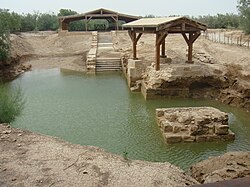Festival of the Three Kings
| Epiphany | |
|---|---|

The Adoration of the Magi by Edward Burne-Jones (1904)
|
|
| Also called | Baptism of Jesus, Three Kings' Day, Theophany |
| Observed by | Christians |
| Type | Church service, winter swimming, chalking the door, house blessings, star singing |
| Significance |
|
| Date |
|
| Frequency | Annual |
| Related to | Epiphanytide, Christmastide, Christmas, Baptism of the Lord, Nativity of Christ |

Al-Maghtas ruins on the Jordanian side of the Jordan River are the location for the Baptism of Jesus and the ministry of John the Baptist.
|
|
| UNESCO World Heritage Site | |
|---|---|
| Location | Balqa Governorate, Jordan |
| Criteria | iii, vi |
| Reference | 1446 |
| Inscription | 2015 (39th Session) |
|
[]
|
|
Epiphany (/ɪˈpɪfəni/ ə-PIFF-ə-nee), also Theophany or Three Kings' Day, is a Christian feast day that celebrates the revelation of God incarnate as Jesus Christ. In Western Christianity, the feast commemorates principally (but not solely) the visit of the Magi to the Christ child, and thus Jesus' physical manifestation to the Gentiles. Moreover, the feast of the Epiphany, in some Western Christian denominations, also initiates the liturgical season of Epiphanytide.Eastern Christians, on the other hand, commemorate the baptism of Jesus on both sides of the Jordan River, seen as his manifestation to the world as the Son of God.Qasr el Yahud in the West Bank, and Al-Maghtas in Jordan on the east bank, Al-Maghtas is considered to be the original site of the baptism of Jesus and the ministry of John the Baptist.
The traditional date for the feast is January 6. However, since 1970, the celebration is held in some countries on the Sunday after January 1. Eastern Churches following the Julian calendar observe the feast on what for most countries is January 19 because of the 13-day difference today between that calendar and the generally used Gregorian calendar. In many Western Christian Churches, the eve of the feast is celebrated as Twelfth Night. The Monday after Epiphany is known as Plough Monday.
...
Wikipedia
